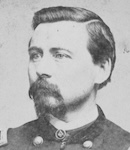 Open main menu
Open main menu
 Open main menu
Open main menu

E.W. Hincks
(1830 - 1894)
Home State: Massachusetts
Command Billet: Commanding Regiment
Branch of Service: Infantry
Before Antietam
He had been a printer and publisher in Maine, but by 1855 was in Boston, a member of the Massachusetts legislature and the Boston City Council. In 1860 he was a 30 year old government clerk living in Lynn, MA and in April 1861 he was commissioned 2nd Lieutenant in the 2nd United States Cavalry. He soon after accepted the commission of Lieutenant Colonel of the 8th Massachusetts Militia (for 3 months' service), of which he'd been Adjutant in 1859. On 16 May he was promoted to be their Colonel and he mustered out with them on 1 August 1861.
Two days later he was selected Colonel of new 19th Massachusetts Infantry, whose ranks were made up of many of the officers and men of the 8th Militia. He led them at Ball's Bluff, on the Peninsula Campaign, and at Glendale, where he was wounded on 27 June 1862. He was back with his regiment for the Maryland Campaign.
On the Campaign
He was seriously wounded while in command of his regiment at Antietam at about noon on 17 September 1862
by a musket ball, which shattered the right radius [forearm bone], and entered the abdomen on a level with the umbilicus, three inches above the middle of the crest of the right ilium, and, having traversed the ascending colon, emerged a little to the right of the lumbar vertebrae.
The rest of the War
He "lay upon the field until about noon of the following day," then was retrieved and taken to a field hospital and treated by Surgeon J.F. Dyer of his regiment. He had "grave" symptoms of peritonitis and on 12 October he was sent to a hospital in Baltimore, MD. A month later he was transferred to Boston.
In March 1863 he was appointed Brigadier General of Volunteers (to date from November 1862), and served on court martial and recruiting duty, was a prison camp commander, and commanded the 3rd Division/18th Corps (US Colored Troops) at Petersburg. He then had draft and recruitment duties.
He was honored by brevets to Colonel, USA for his service at Antietam and Brigadier General, USA for his service at Petersburg.
After the War
Continuing in US Army service he was appointed Lieutenant Colonel of the 40th US Infantry in 1866, transferred to the 25th Infantry in March 1869, and retired at the rank of Colonel in December 1870.
From 1870 to 1873 he was Commandant of the National Home for Disabled Volunteer Soldiers at Hampton, VA and then to 1880 at the branch of the Home near Milwaukee, WI. By the 1890 US Veterans' Census he was living in Cambridge, MA.
References & notes
His service from Heitman,1 as Edward Ward Hinks, and his Compiled Service Records,2 online from fold3. Antietam wound and hospital details from the MSHWR.3 Personal details from family genealogists, the US Census of 1860 & 1880, and the Massachusetts State Census of 1855. His gravesite is on Findagrave. His picture from a Brady Studio photograph now at the Library of Congress.
His surname is seen during the war years as Hinks - a misspelling he apparently tolerated through his military service to the end of 1870.
He married Ann Rebecca “Annie” Dow (c. 1838-1862) in Boston in January 1855 and they had a son Anson; their son died in January 1862 and Annie 8 months later. He married again, Elizabeth Pierce Nichols (1842-1890) in September 1863 and they had a daughter Bessie (1865-).
Born Hincks, he spelled his surname Hinks until about 1871, then returned to the original.
His brother Elisha Albert Hincks (1828-1907) was also in the 19th Massachusetts and wounded at Antietam.
Birth
5/30/1830; Bucksport, ME
Death
02/04/1894; Cambridge, MA; burial in Mount Auburn Cemetery, Cambridge, MA
1 Heitman, Francis Bernard, Historical Register and Dictionary of the United States Army 1789-1903, 2 volumes, Washington DC: US Government Printing Office, 1903, Vol. 1, pg. 532 [AotW citation 29412]
2 US War Department, Compiled Service Records of Soldiers who served in US Volunteer organizations enlisted for service during the Civil War, Record Group No. 94 (Adjutant General's Office, 1780's-1917), Washington DC: US National Archives and Records Administration (NARA), 1903-1927 [AotW citation 31579]
3 Barnes, Joseph K., and US Army, Office of the Surgeon General, The Medical and Surgical History of the War of the Rebellion, 6 books, Washington DC: US Government Printing Office, 1870-1883, Volume 2, Part 2, p. 78 [AotW citation 31586]